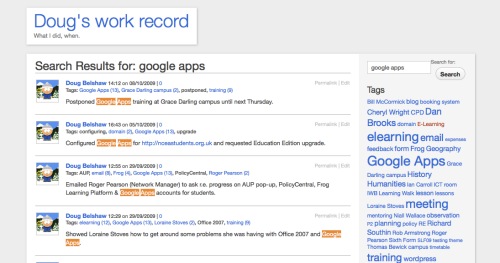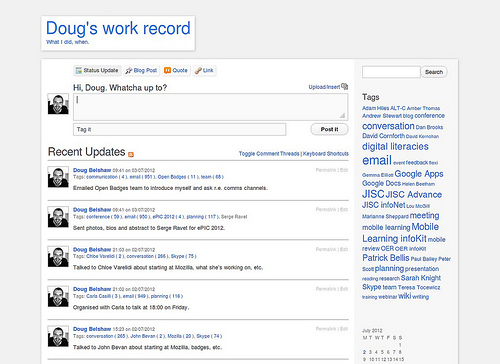Last Thursday I was down in London for an Open Badges design day at the Mozilla office in Leicester Square. It was run by DigitalMe, the only UK winners of the DML Badges for Lifelong Learning competition.
I was asked by a couple of students who were there if they could interview me given my new role as Badges & Skills Lead for the Mozilla Foundation. I was more than happy to oblige. 🙂

If I buy a physical book from a bookshop I can lend it to someone else. And, when I’m finished with it, I can sell it.
If I buy an e-book from, for example, the Amazon Kindle store, I can’t (in the UK, currently) lend it. I can’t sell it.
The same is true of most digital formats.
That’s something that bothers me: how come I don’t own a digital copy in the same way as a physical copy?
Well, thankfully, that may soon change. A recent EU ruling about computer programs could have far-reaching consequences:
The first sale in the EU of a copy of a computer program by the copyright holder or with his consent exhausts the right of distribution of that copy in the EU. A rightholder who has marketed a copy in the territory of a Member State of the EU thus loses the right to rely on his monopoly of exploitation in order to oppose the resale of that copy… The principle of exhaustion of the distribution right applies not only where the copyright holder markets copies of his software on a material medium (CD-ROM or DVD) but also where he distributes them by means of downloads from his website.
So a publisher’s distribution rights end when they sell a computer program or game for the first time.
Furthermore:
The Court observes in particular that limiting the application of the principle of the exhaustion of the distribution right solely to copies of computer programs that are sold on a material medium would allow the copyright holder to control the resale of copies downloaded from the internet and to demand further remuneration on the occasion of each new sale, even though the first sale of the copy had already enabled the rightholder to obtain appropriate remuneration. Such a restriction of the resale of copies of computer programs downloaded from the internet would go beyond what is necessary to safeguard the specific subject-matter of the intellectual property concerned.
In other words, publishers can’t expect to make a profit every time a new person plays a game (or reads a book).
Hurray for common sense prevailing!
Image CC BY-NC-SA …-Wink-…
Back in 2009 when I was Director of e-Learning of The Northumberland Church of England Academy I started tracking my own activities.
Using a private WordPress-powered blog with the P2 theme, I quickly logged what I was up to, adding tags as I went. Below is the tag cloud after one month of using the system as a Senior Leader in an newly-minted Academy:

As you can see, the following tags were prevalent (I don’t think I included teaching in there for some reason!):
- Google Apps (I was responsible for deploying it across the 9-site Academy)
- Elearning (obviously)
- Meetings (lots and lots of these)
- Email (a necessary evil)
- Dan Brooks (an M.Ed. student from an Australian university whom I mentored during extended teaching practice)
- Training (I led plenty of sessions)

The above screenshot is from yesterday, soon after finishing my two-year stint as Researcher/Analyst at JISC infoNet. Apart from changing my avatar and tweaking the colour scheme, what’s changed?
- The email tag is much larger in this cloud. I was working in an office rather than a school, after all.
- JISC, JISC Advance and JISC infoNet unsurprisingly figure a lot.
- Google Apps remains there as I implemented and supported the system for the 19 JISC Advance services.
- Mobile Learning infoKit is there as it was a major piece of work for me during my time at JISC infoNet.
- Digital literacies features due to my work in the area and programme support for the JISC Developing Digital Literacies programme.
- Patrick Bellis was my boss at JISC infoNet and Sarah Knight the JISC programme manager with whom I had the most dealings.
- Other people’s names feature as well – interestingly Dan Brooks (M.Ed. student at the Academy) is still there three years later. Just goes to show how intense that period was!
Finally, you can see that wiki and Skype are small but significant in the tag cloud. I’ve never worked for an organisation that had better knowledge management and procedures than JISC infoNet. The internal wiki had everything you needed to work effectively and was an active, living repository of information. Skype is used extensively throughout JISC, sometimes for calls, sometimes for ‘backchanneling’.
If you’d done something similar which tags would YOU expect to show up?



